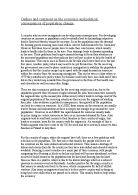Outline and comment on the economic and political consequences of population change.
Outline and comment on the economic and political consequences of population change.
A country who receives immigrants can develop many consequences. For developing countries an increase in population could eventually lead to diminishing outputs as land is fixed and thereby cannot be increase. So as the population rises the demand for housing grows meaning more land will be used to build houses for the ‘homeless’. However this takes time so people have to make their own houses, which usually leads to health risks for those in the area. Poor drainage leads to diseases spreading in the area. These problems lead to governments having to focus their attention on the increased population and what policies they will put in place to help the health of the homeless. This can be seen in Brazil in the favelas which have form over the last few years. Another policy which may need to be put forward are, for the receiving the government may need to place controls on immigration to stabilize the population growth so that the country can get up to speed with the rapid demand on resources within the country from the incoming immigrants. This can be seen in china where in 1979 they introduced a policy where by families could only have one child and if they did so they would reap rewards form the government in the form of free health care and education as well as many other things.








